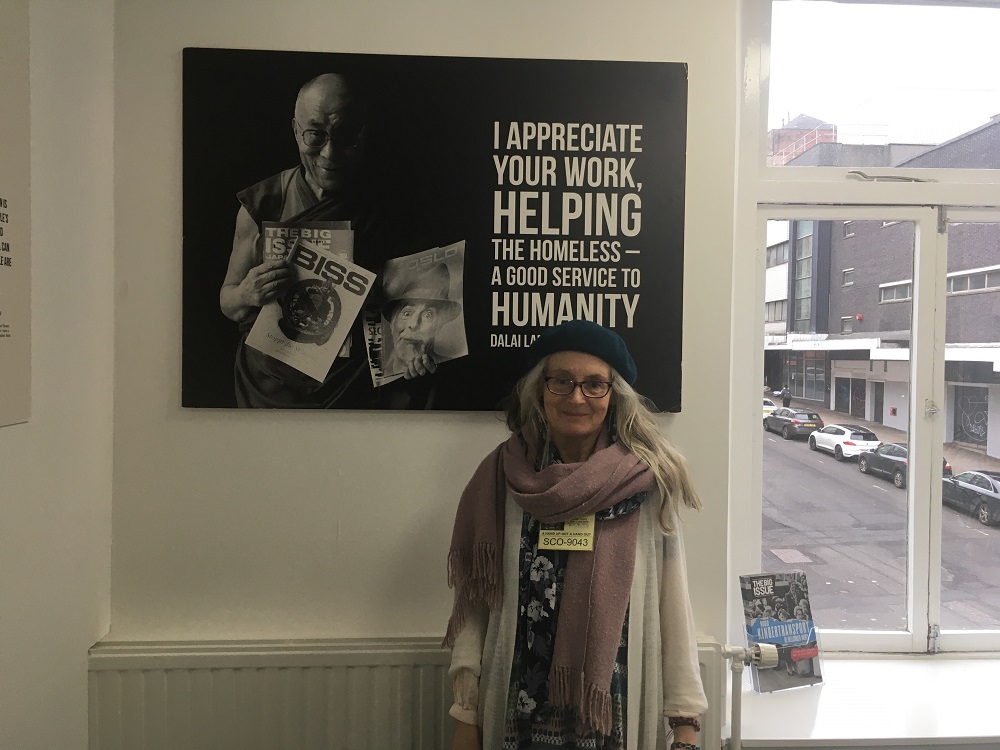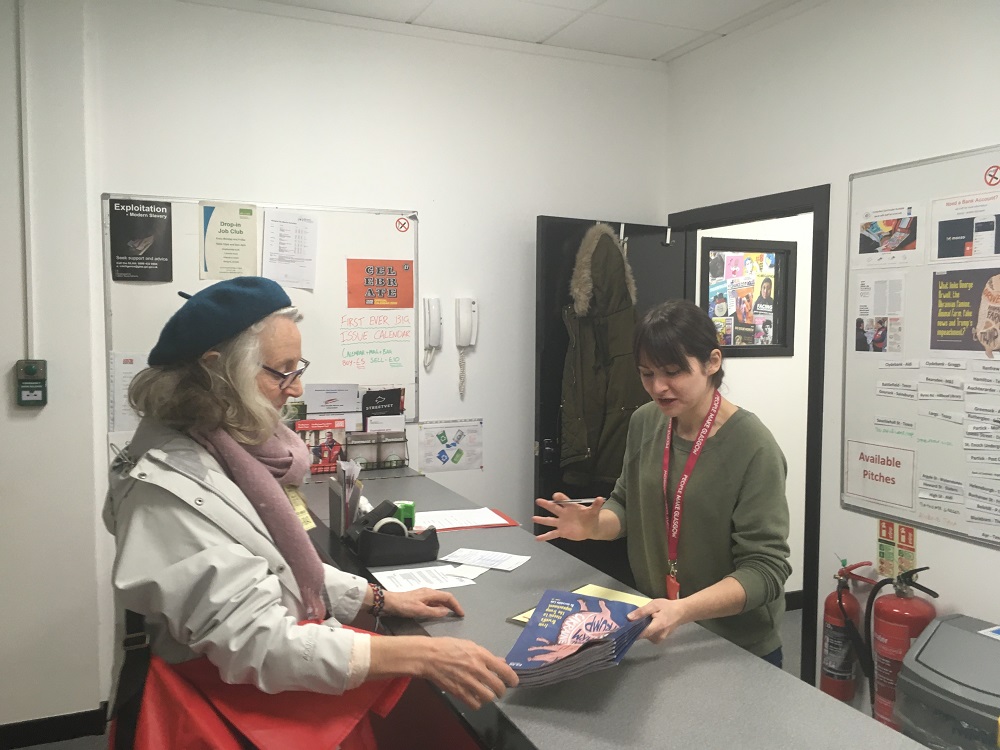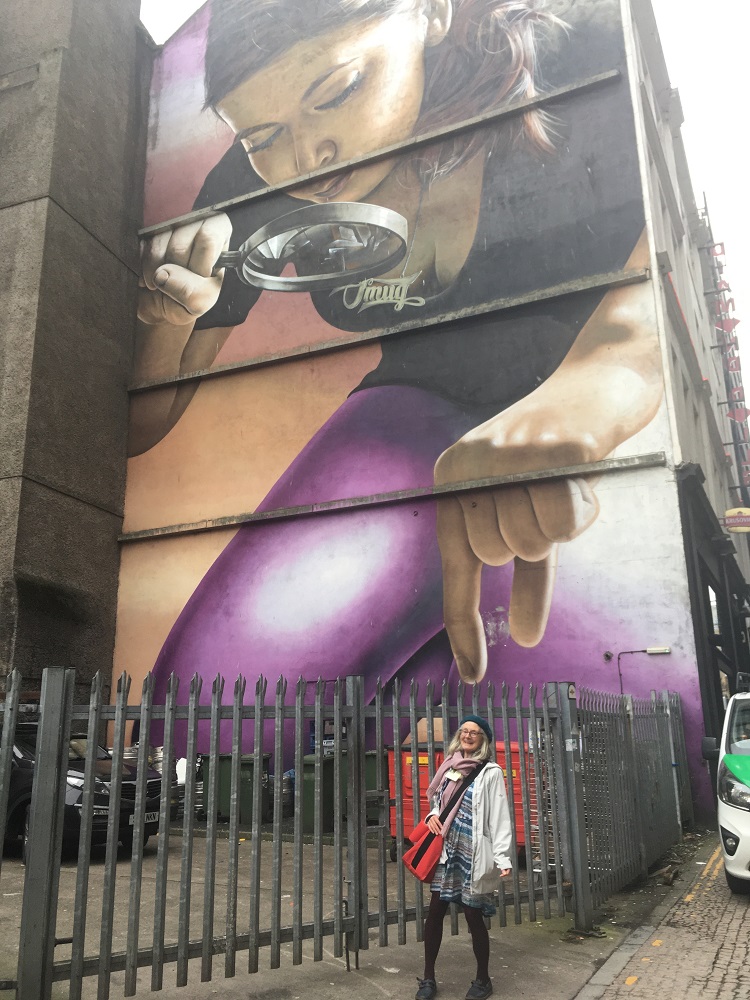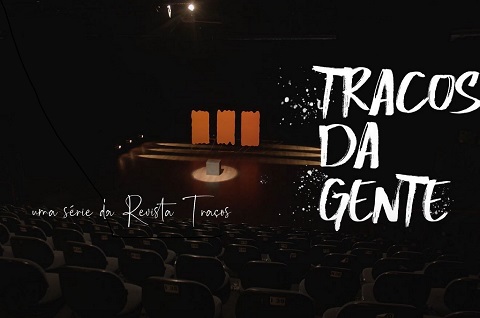Anabel has been a Big Issue vendor for about eight weeks, so she is a relative newcomer to the street paper’s distribution office in the busy city centre of Glasgow. She has popped in for a chat before she heads to Glasgow City Mission for the women’s coffee morning and breakfast. She won’t be selling at her pitch – at the foot of Buchanan Street, Glasgow’s main shopping route, outside the entrance to a glamorous upmarket department store – until this afternoon, and she has about enough copies of the current edition of the magazine in her bag to last her. Just as well – it’s dreich outside [a Scottish word for cold, wet, bleak weather]. But this is Scotland – Big Issue vendors have to contend with that on a daily basis.
It isn’t fortuitous or planned to bump into Anabel on this day, approaching the end of #VendorWeek, the street paper network’s annual celebration of vendors. It’s just normal – INSP recently moved its base of operations to share an office with The Big Issue. The editorial team upstairs, INSP is connected by just a doorway to the regular coming and going of vendors as they pass in to buy magazines to sell, pick up uniform or badges, ask for advice, or just catch up with the staff that man the distribution desk.
But perhaps it is kismet that Anabel is the vendor to sit down and talk about her relatively brief time as a vendor – she has been a part of The Big Issue for about as long as INSP has been the UK street paper’s office neighbour.

Originally from the Lake District in England, Anabel – 65, “and a half” as she jokingly insists – has been homeless for around two years, and found herself in particularly dire straits when she spent the last of her savings on rent for an apartment that she says was “uninhabitable”. Though she had support from a local housing charity, she wasn’t able to recover the money she lost. After that didn’t work out in early December, perhaps a little desperate, it was a turning point for her. Now, she’s earning an income through The Big Issue, stays in a nearby hostel, which she likes and is comfortable in, and is waiting to hear about her eligibility for a state pension.
“As with every vendor probably, there have been plenty of times when people have been unfair to me in the past. When someone comes over and is so generous, warm, kind, and friendly, and identifies with you – that has an incredible effect on you,” she says about the experience of standing at her pitch and selling the street paper. “In a way, it’s putting back what’s been taken from you, and more on top of that. That generosity of spirit gives me the strength to carry on having lost everything.”
Smart, well-spoken and articulate, and well-kept, Anabel is not the standard mainstream stereotyped depiction of a homeless person. She has struggled with money and family issues, and been unable to find work and has even been taken advantage of. But she refers to herself as “privileged” numerous times in our conversation, and is in high spirits.

Anabel keeps herself busy. When she’s not selling The Big Issue or attending social opportunities, she’s learning Gaelic. That is how she really learned about the work of The Big Issue. To practice, she had been watching BBC Alba [a Scottish television channel operated by the public broadcaster for the Gaelic-speaking community] and happened upon a documentary focusing on homelessness and including interviews with Big Issue staff. That’s when she realised The Big Issue was based in the centre of Glasgow and it prompted her to pop along. It was a glimmer of hope in a time when, not long before Christmas, she felt a little down and out. She’s been selling the magazine ever since.
“It’s a proper job in its own right, in a very simple way. I don’t have to fill in forms, I don’t have to wait for my wages,” she explains. “It’s very inclusive and actually means I can keep my independence. If I work hard, it means I can choose where I stay and what I eat.
“There have been times when I’ve felt in danger, financially and otherwise. It enables you to have a life, that’s what is so important. I’m not being given endless appointments, waiting at the homeless office, sitting on endless plastic chairs in gloomy surroundings. I’m out on the street meeting folk.
“What you do need for basic happiness is just a tiny bit of the things that we all need: warmth, shelter, financial security. And this gives me that. It means I’m not so frantically trying to cope on a day to day basis, and will eventually have time to sit down and write a CV and fill out job applications.”
Interactions with other people are particularly important to Anabel. “I love meeting people. I feel hugely privileged. It’s funny, you’re holding up The Big Issue and it’s so seldom the person you see in the middle distance, that you’re kind of aiming your beaming smile at, is the one who comes up to you. They always come from left-field. And it’s always like they bring their own little shiny light with them. They cross the divide. They’re going to engage with someone who actually is the first line of homelessness, buy a magazine and tell you something about themselves or ask you something about yourself.”

Anabel has a very intricate understanding of the whole Big Issue operation, despite having only been selling it for a couple of months. She mentions “bringing people into the readership” and takes her job very seriously. She loves the journalism and is always advocating for the stories in the magazine to her customers. She likes the “joined-up thinking” of the writing. She admits that she sometimes wants to just give the magazine away to a stranger just to try and entice them, and then ask them to give that back to another vendor because “when you help any Big Issue vendor, you’re also helping me”.
“The one thing I never lose faith in is the magazine,” she says. “Sometimes people can be unkind to you. Or sometimes you’ve gone for about an hour and you begin to feel a bit wobbly. ‘Oh my god, what’s the matter with me? Nobody’s showing an interest’. But I have the confidence to keep going because I know I’m selling a magazine that I am proud of. I can hold it up and say take it or leave it. It’s a conscious choice of every individual to come over and buy it.”
Anabel’s short stint so far with The Big Issue is evidence of how quickly a person’s involvement with street papers can affect their lives in numerous ways, from earning those vital extra pounds to live life independently, to creating stress-free time to look for what to do next. Anabel sees herself working at a bookstore or in tourist information – somewhere she can communicate something she is passionate about.
“My life could not have gone more unpredictably wrong, but also more unpredictably right,” she says.
Read more coverage of #VendorWeek 2020 here




















